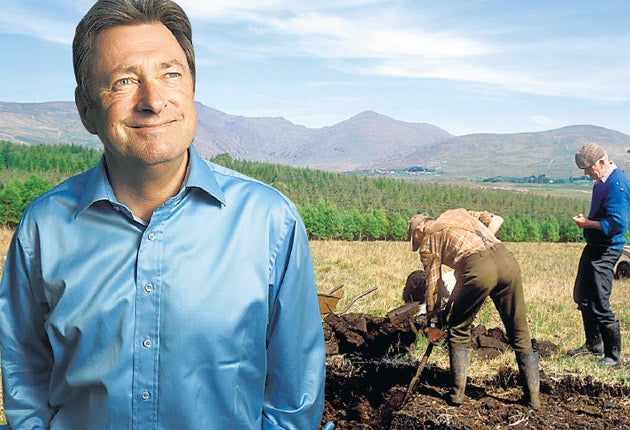Titchmarsh named and shamed as peat compost row cuts up rough

A survey of some of Britain's leading gardening experts, including the former Gardeners' World presenter Alan Titchmarsh, shows less than half use peat-free compost.
The results of the survey by the RSPB wildlife charity look set to reignite the debate over peat extraction, which has raged for 20 years. Last week, Alan Titchmarsh was criticised by Friends of the Earth for arguing in Gardeners' World magazine, that sometimes there was no alternative for gardeners.
The RSPB wants a Government tax on peat products – such as £1 on the average bag of compost – to encourage people to buy greener alternatives. Conservationists say extracting peat for use in gardens in the UK, much of which is from Ireland and the Baltic, leads to carbon dioxide emissions and damages natural habitats and wildlife.
According to the survey of 27 gardeners, broadcasters and writers, two-thirds backed the Government's aim of phasing out peat products. Most also thought consumers did not know enough about the environmental impact of peat extraction to make an informed decision.
Alys Fowler, former presenter of the BBC's Gardeners' World and The Edible Garden, who does not use peat, said a levy on peat products would make "a real difference". She said: "I think there needs to be more education about the benefits of the non-peat compost – it can be just as effective as peat.
"As well as reducing carbon emissions and protecting peat bog habitats, peat-free compost is also a great way of recycling our waste. Just as we do not have endless peatbogs, we also do not have bottomless landfill sites."
Writing in Gardeners' World, Mr Titchmarsh defended his green credentials, saying he mostly gardened organically, conserved water and supported wildlife in his garden. But he said he used peat compost for seedlings that would otherwise fail to thrive. Other gardeners who still used peat include Noel Kingsbury, Christine Walkden, Helen Yemm, Bob Flowerdew and Adam Pasco, editor of Gardeners' World.
The RSPB said some of those who responded to their poll were concerned that the lack of decent and widely available peat-free alternatives was a problem for gardeners keen to make the switch from peat.
Olly Watts of the RSPB said: "Peat extraction is a significant source of carbon emissions and causes destruction of natural habitats. Many gardeners understand this and are reducing the amount of peat-based compost they use, or switching to an alternative."
But he said the Government should introduce a non-voluntary approach such as a levy to create financial incentives for consumers to switch and for industry to step up the challenge to develop high-quality alternatives to peat-based compost.
Gardening writer and broadcaster Nigel Colborn argued that peat should be rationed. "Until now, no satisfactory material has been proven to work as efficaciously as sphagnum moss peat. The material has unique qualities of water absorption and retention, couple with an extremely slow decomposition rate," he said.
"At its height, Irish horticultural peat production was in the region of 240,000 tonnes per annum, compared with the 7.5 million tonnes burnt in the Republic's power stations," Mr Colborn said. "And the horticultural peat was a by-product, scraped from the top of the bog, before the 'turf' was extracted. Presumably, that by-product is now simply going to waste, or is being sold to Britain's competitors in Holland, Italy, France," Mr Colborn added.
The Nursery Owner's Story
No excuses: the alternatives are cheap and easy
I haven't used peat for over 10 years. Until four years ago I was an amateur gardener, but in 2007 I took over the Bluebell Cottage Gardens and Nursery in Cheshire, producing 30,000 herbaceous perennials, shrubs, trees and annuals each year. The nursery has not used peat since I took over. Everything goes in commercially supplied peat-free compost – I use New Horizon (and no, I don't get commission from them, nor do I sell their compost).
Visitors comment daily on how healthy our plants look. On Monday, we open under the National Garden Scheme and I'm confident everything will look wonderful. The trouble with Alan Titchmarsh's remarks are that amateur gardeners listen to him, and the message is clear – if the great AT can't grow without peat, then they surely can't. And that, I'm sorry to say, is simply not true. Sue Beesley
Join our commenting forum
Join thought-provoking conversations, follow other Independent readers and see their replies
Comments
Bookmark popover
Removed from bookmarks